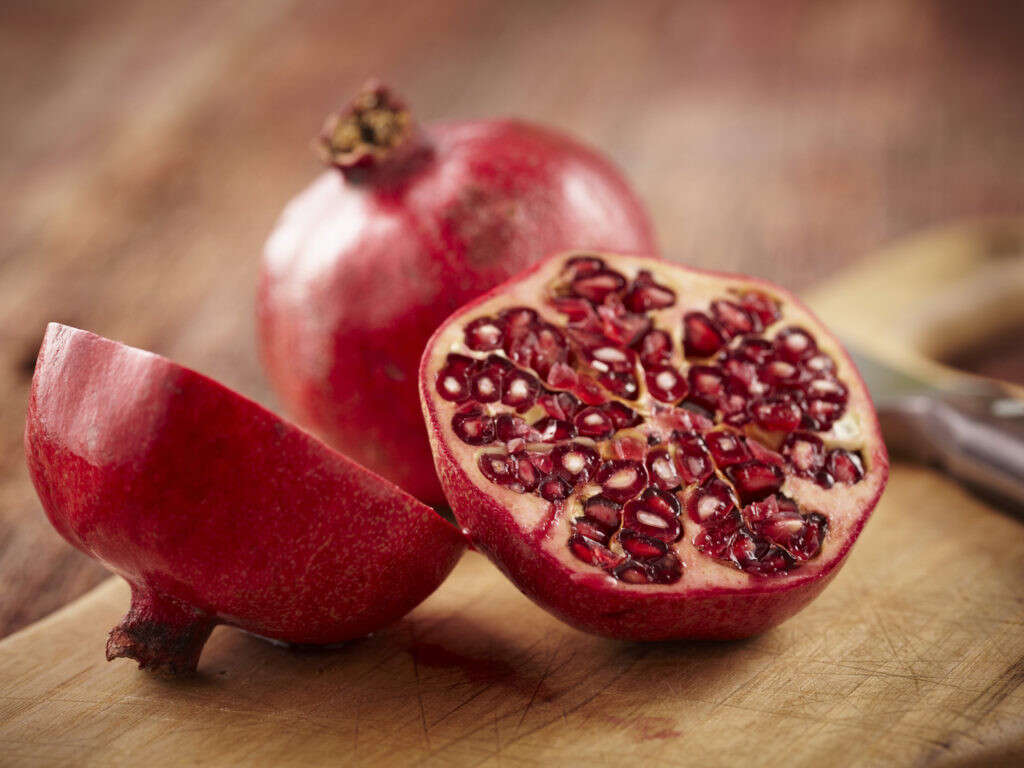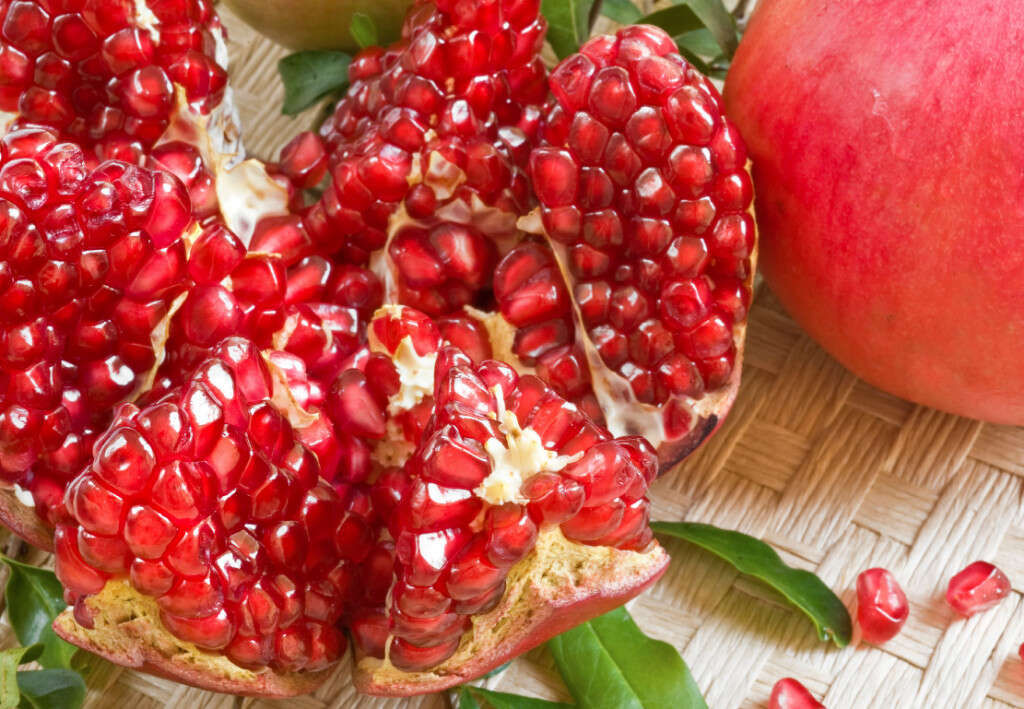10 Benefits Of Pomegranates
Pomegranates are known for their extravagant color and resemblance to flowers. The fruit is grown in warm climates and is dominantly harvested in Iran, India, and Mediterranean countries. It is also cultivated in Northern California and Arizona.
The fruit was first introduced in California by the Spaniards in 1769. The fruit is a part of the berry family and can have either a sweet or sour taste depending on how ripe the fruit is.
The pomegranate market saw a sharp decline in 2012. However, due to increased research on the health benefits of the fruit, increased supply and demand for it is likely to ensue.

Pomegranates Benefit #1: Rich in Antioxidants
Pomegranates are rich in antioxidants. Their dark red color comes from polyphenols, which are packed with antioxidants. In comparison to popular fruit juices and wines, pomegranate juice has three times more antioxidant content. The three main antioxidants in the fruit include tannins, anthocyanin, and ellagic acid. These three antioxidants have many health benefits.
Antioxidants, also known as free radical scavengers, are crucial in the fight against oxidation. Free radicals are harmful because they are highly reactive and can cause damage to proteins and DNA. This can lead to cancer, Alzheimer’s, or inflammation. Antioxidants can slow or prevent damage caused by free radicals.

Pomegranates Benefit #2: Heart Health
Atherosclerosis is the formation of plaque in the walls of the arteries. It can lead to restricted blood flow, which can cause coronary heart disease, heart attack, or even a stroke. Atherosclerosis is a chronic disease; thus it develops over time. Numerous factors come into play with its development such as genetics, socioeconomic status, and of course, diet.
One study compared the effects of pomegranate powder on atherosclerosis lesions on mice. The results revealed the group, who was supplemented with pomegranate powder, saw a reduction in lesions by 70%. In addition, LDL cholesterol was decreased and HDL levels were increased. It is believed this positive result is related to the fruit’s high fiber content and rich polyphenols.

Pomegranates Benefit #3: Rich in Fiber
Fiber is essential to a healthy stool and can ease constipation. There are two forms of fiber: soluble fiber and insoluble fiber. Soluble fiber slows the absorption of food. This absorption helps control diabetes as the food is not absorbed quickly, causing a spike. Insoluble fiber does not dissolve in water, rather its purpose is to attract water and create bulk that eases the movement of stool. This helps with constipation.
Most people do not get enough fiber in their diet. It is recommended for women to eat 25 grams and men to eat 38 grams of fiber a day. On average, Americans only consume 50% of the required amount. Luckily, just one pomegranate contains about 45% of the necessary dietary allowance a day. Making it a good source of fiber.

Pomegranates Benefit #4: Rich in Folate
Folate is a B9 vitamin that is essential during early pregnancy. It is recommended for women of child bearing age to obtain 400 micrograms of folic acid a day. The reason such as emphasis is placed on women of child bearing age is because neural tube defects can develop within the first three weeks of pregnancy. Many women do not know they are even pregnant this early, thus the requirement is placed on all women who might become pregnant.
Neural tube defects are defects with an infant’s brain and spinal cord, which can really deteriorate their quality of life. Pomegranates are rich in folate. One pomegranate contains 30% of a women’s dietary allowance making it a great source of folate.

Pomegranates Benefit #5: Fights Prostate Cancer
Prostate cancer is common amongst American men. 1 in 9 men in the United States will be diagnosed with the disease. Some studies have shown a link between the consumption of pomegranate juice and decreasing the growth of cancer and increasing life span.
One study done on colon cancer males, evaluated the effects of pomegranate consumption on the prostate-specific antigen (PSA). This antigen essentially detects cancer. If the level is too high, it means the cancer is worsening. Patients with colon cancer wish to slow the progression of this number. Patients were given 8 ounces of pomegranate juice a day for 6 months. A decrease in the PSA number did not occur, however, in comparison to participants who did not consume the juice, a delay in PSA increase was evaluated.

Pomegranates Benefit #6: Fights Breast Cancer
In addition to its positive effects on colon cancer. Pomegranate has also been linked to having positive effects on fighting breast cancer, the most common cancer amongst women.
Breast cancer is linked to the overproduction of estrogen. Thus, some doctors recommend keeping estrogen levels low in the body. Pomegranate juice contains the antioxidant, ellagittannins, in abundance. This antioxidant inhibits the aromatase enzyme, which is one enzyme that plays a key role in making estrogen. With its inhibitory effects on the hormone, researchers believe it can help supress the cancer. Studies of the antioxidant support this ideal, revealing pomegranates decreased cancer cell growth. However, studies have only been done on animal models.

Pomegranates Benefit #7: Rich in Vitamin C
The fruit is very high in vitamin C, which is essential for the growth and repair of tissues, production of neurotransmitters, and is an antioxidant that can help prevent cancer. Vitamin C is a water soluble vitamin, meaning our bodies do not have storage for it. This means we require a continuous daily supply of the nutrient from our diet.
Just one pomegranate contains almost 50% of the recommended daily allowance, making it an excellent source of vitamin C.

Pomegranates Benefit #8: Memory
With so much information and stimuli being thrown our way, it can be difficult to remember all the information to which we are being exposed. Pomegranates have been linked to memory improvement.
In one study, it was revealed pomegranate supplementation had protective effects against memory dysfunction in individuals who just undergone heart surgery. Memory dysfunction is common after heart surgery because the trauma can cause oxidative stress. Pomegranates being rich in polyphenols appears to have protective effects of this instance. Through the study, it was found that the patients who were given the supplementation performed better when given memory retention tasks. In another study, mice who were supplemented with pomegranate performed better at memory tasks in comparison to a placebo group

Pomegranates Benefit #9: Diabetes
The fruit has a low glycemic index. Foods with a low GI are essentially foods that are absorbed slowly by the digestive system and do not cause a rapid spike in blood sugar. These types of food are essential for diabetics.
In one study, which evaluated the effects of pomegranate juice on atherosclerosis in type 2 diabetics, two things were found. One was that, drinking 6 oz. of the juice every day for three months decreased plaque in the arterial walls. The second finding was that although the juice contains carbohydrates, there was not an increase in blood glucose levels during the time, thus eliminating the popular notion that diabetics must eliminate all traces of carbohydrates from their diet.

Pomegranates Benefit #10: Arthritis
Pomegranate juice has been linked to delaying arthritis. Arthritis is the inflammation of one or more joints causing severe pain and stiffness. More than 3 million people are affected by arthritis.
Pomegranate is rich in flavonols. It is believed these flavonols can block the inflammation that contributes to joint pain. Currently research in inconclusive, however, researchers are confident future studies will confirm the link.












